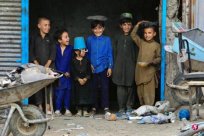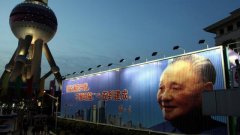When we have some resources of dialect culture, we have not been completely lost, our generation may have time to make some attempts and discussions, at least let the next generation have the right to decide whether to decide on the road, whetherSee the language landscape we have witnessed.
Reading Professor Guo Zhenyu's Hongwen Singapore Chinese Dialects serialized in the Lianhe Zaobao on August 15th and 16th: Where is the road?In the past two articles, the heart is surging after reading. After reading, the tip of the tongue is mixed. After reading it, it seems to be questioned by the Examination Committee: Where is the front road of the dialect?Even -Dialects have a way to come, and is there a front road?
Guo Zhenyu started talking about Singapore as an immigrant society. In the early years, it was naturally recognized by dialect ethnic groups and dialects as the cornerstone.Friction, and the communication obstacles caused by dialects.Looking back at the past, we can understand that under such a complex language background, we put forward the important integration purpose and communication effect of "speaking more Chinese and speaking less dialects".Indeed, this language policy has been greatly successful. From the social language census, we see that the Chinese residents who use dialects most often at home have been reduced from 81.4%in 1980 to 11.8%in 2020. Chinese language has completely replaced Chinese.dialect.Our social language appearance and family language structure are completely different. Today's dialects not only cannot interfere with the use of Chinese language at all, but also will not have a counter -effect and negative effect on the climate of social language.Essence
Rawnate Leading Discussion
Under such a big background, Guo Zhenyu clearly proposed that as the times move, language policy must be re -examined and reviewed. For dialects, it is possible to consider opening up.I think whether it is possible to conduct a prerequisite research and discussion on a rational and scientific manner before comprehensive opening up.Just like when we are in the "Singapore Journey" movement, the public opinion is widely held.The interviewees of the layer understand the people's ideas from the perspective of personal experience and the language use of the family generations.If there is such a demand, pilot or discuss it in a small range or period to see if there are any negative effects, and then consider gradually relaxing or tightening.In this way, the hearts of the people and the voices may be responded.
In fact, I did not have a complete grasp of the public opinion I may be collected in the end, and even suspected that if it was really open, there would be no more enthusiastic response, but I was willing to try from a ideal perspective to discuss the dialect from the dialect to unbind the tie of the dialect.Possible pros and cons.
When we vigorously advocate an open type of multiculturalism, multiple languages, tolerance and integration, seeking common groundlihood, and wide red dot Singapore, the dialect has a language that can be used as a traditional and custom, becoming us more.A diverse cultural carrier, a lubricant to promote rich communication?For the pragmatic Singapore, we need to eliminate all the excessive romantic imagination of dialects and ancient feelings first, and ask such problems in the guidance research: Whether dialect can help us in the world situation in the world of globalization after the epidemic., Turn Singapore into a country with richer, more diverse, more humane, and more unique cultural characteristics?In the process, dialect -whether it is language or culture -whether the story of the Singaporean story is a kind of help or resistance, whether it is resources or cumbersome?Can the story of Singapore only use a sound of unity, or multi -channel can help us let more different audiences listen?Is it the power of helping us forward, or to pull our development hind legs?
Let's take a closer look. The census has used data to tell us that the social language environment that banned dialects from that year has been very different from the current environment of English.At present, we want to let the next generation of contact with more mother tongue and mother tongue culture. We like to see that Prime Minister Huang Xuncai reiterates and emphasizes the government's attention and determination to bilingual in the Chinese National Day mass speech.We know that the soul of language is a culture, so we implement not only bilingual, but also an indispensable double culture.
Double culture is not only a high -level course that can be selected only with particularly excellent students, but the connotation and soul that casts in the language.Therefore, can we ask in advanced research: Can dialects help students get closer to the traditional customs and culture of the Chinese?Perhaps we can also test and use the learning and acquisition of Chinese language through the design of linguistics to test the learning and acquisition of Chinese language.Generally speaking, predictable negative migration is more negative or on the effects of voices and a small number of vocabulary and grammar; positive migration is at the level of most vocabulary, grammar, language sense, and even content and cultural connotation.Because the words of dialects have corresponding or even the same words as Chinese language, and the use of words is close.
We can ask further: 1. In terms of language learning, voice adjustments are faster and simple than vocabulary and grammar re -learning?2. In terms of cultural heritage, dialects, as a carrier, are the spread and absorption of culture and customs bonus or reduction?3. In terms of interpersonal communication, does dialects make it easier for us to communicate with our next generation of young people and elders, and even more likely to communicate with other dialects in areas?Finally, it is objectively and scientifically answered: Dialects' learning of Chinese language, and even the shaping of the bilingual dual cultural environment, is the benefit greater than disadvantages or disadvantages?
Affirm the government's policy adjustment
With the changes of the times, we must be sure that the government has been loosened in language policy. For example, the new rumor of the Liang Wenfu sparrows mentioned by Guo Zhenyu once was banned for 23 years because of dialect lyrics and finally in 2013 in 2013, and finally in 2013The annual ban is lifted and allowed to be broadcast in the air.In 2016, the new media broadcast the dialect TV series?; In 2021, the Dialects Magazine showed a happy family and encouraged people to live a healthy life.As for the radio station, although the period is not long, there have been dialect news and information.Because of the development of technology and media, we can easily contact foreign language programs in Singapore, such as Japanese, Korean and other series and movies, and even dual -channels for us to choose.Appears on broadcasting or TV.Since we already have dual -channel technology, is it possible for us to make or introduce some dialect programs and provide language options?We have the ability and resources to be greater, and even from a higher, more macro perspective, to treat the language of Volkswagen Media?
Guo Zhenyu said that the dialect was not a flood beast.He is not a "zero sum" relationship with Chinese.I tear twice on the four -sided wall article on May 4 this year, and wrote in a close range: In 2011, I discussed the language topic with Mr. Li Guangyao with international scholars in 2011.Automatically discern different languages and dialects.Scholars frankly share the results of research on Hong Kong, Belgium, and Canada, mentioning that dialects are related to culture, and they will not weaken students' reading ability.If it belongs to the same or similar language, the language is complementary and the positive effect of positive migration.Therefore, Chinese and dialects may not only be zero -sum relationship, but also have a close relationship with complementary or multiplication.
"Why don't you teach me dialects?"
In the past, let us talk about it, and even proud of many of the impression of many Singaporeans abroad. How do we have such a high language talent: speaking Popular calls in Beijing, speaking Cantonese in Hong Kong, in FujianOr Taiwan speaks southern Fujian, uses English in the West, and even in Chinatown in Western countries, it can be integrated with dialects better than locals.We use Chinese English and dialects to communicate with people from various places freely, and it is even easier to obtain emotional links.We know that even if we do not necessarily know all kinds of dialects, most of them can understand, and we can do daily dialogue.
Today, the impression that our next generation gives people abroad is probably English and Chinese.Bring some time agoChildren go to Hong Kong and Fujian.During the day, I was free to move near the hotel because of a meeting.When we meet at night, their first sentence is: "Why can't I not teach me dialects?" They watched our adults can communicate with the locals freely with dialects.Knowing what you have lost, now you are starting to realize the ability to communicate, and the two perspectives of observing the world.
They also said that in the past, they thought that dialects were just spoken and even more vulgar speaking.However, local creative use of dialect posters and TV advertisements have repeatedly subverted their senses.As a student of the Chinese Department, of course, when I took the opportunity to mention the rhyming rhyme and academic rhyme training of learning poetry, the dialect was too helpful, and I could even use the ancient sounds close to the ancients to read the ancient poems that have been circulating for thousands of years.The infectious power of the lingering rhythm.Of course, we don't expect children to learn dialects to read ancient poems or ancient essays, but we hope that they will not lose the multiple perspectives of communicating ancient, modern, Chinese and foreign.
When our country moves rapidly and develops at a high speed, when we still have some resources of dialect culture, we have not been completely lost, and our generation may have time to make some attempts and discussions.Have the right to decide whether to see the language scenery we have witnessed on the road.
The author is engaged in Chinese teaching and local cultural research




